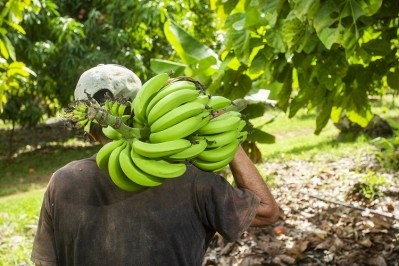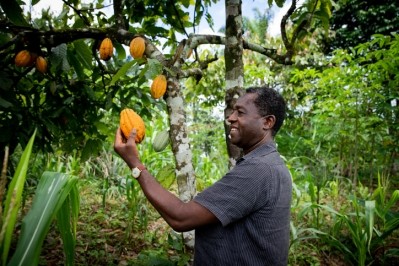'Partnership, rather than exploitation’: Getting farmers a fair deal

“Farmers getting a fairer deal looks like trade relationships based on partnership rather than exploitation,” Amanda Archila, Executive Director of Fairtrade America, told FoodNavigator.
Receiving just and equitable remuneration is based on a trading system that honours the farmers and farm workers who play a critical role in our food systems and should be recognised for their labour accordingly. “It’s also a world where the inherent risk and burden of farming are distributed across the supply chain rather than resting primarily with farmers,” Archila added.
The global farming landscape requires several actions to make these goals a reality, Fairtrade states. Stable pricing that covers production costs and a living income for the people working on farms is vital, and farmers need to have a seat at the decision-making table regarding price, standards and policy. “Anything that affects them should include them,” said Archila.
Farmers should also see strong, long-term, mutually beneficial relationships between buyers and producers. Robust relationships with and communication between leaders and companies in positions of power are also crucial. “Governments and businesses need to step up to prioritise farmers and support them in navigating the highly volatile realities of the industry, like inflation and climate change,” Archila told this publication.
Third-party verification also needs to be present to continuously assist in pushing industries forward and help companies improve to align with the latest best practices.
Protecting livelihoods
“As we have seen over the past few years, change can happen quickly, and it affects us all,” says Archila. Global events like the war in Ukraine, changing harvest seasons, supply chain disruptions and the COVID-19 pandemic have real and direct impacts on farming communities, affecting factors such as fertiliser costs, labour force availability and crop yields.
Yet, Fairtrade asserts that the “playbook to make this a reality already exists”. The organisation is currently working with over 2,500 brands worldwide that have baked fair pricing into their business practices and are stepping up to better prioritise the farmers and farm workers in their supply chains. “We just need to keep going, keep scaling and keep listening to farmers,” Archila added.
Coinciding with Fairtrade Month in October, the global organisation—often recognised by its label—launched its ‘We Are Fairtrade’ campaign. Together, Fairtrade America and Fairtrade Canada partnered with more than 50 brands for the campaign. Fairtrade designed the campaign to creatively close the gap between farmers and consumers. Created in collaboration with local artists, Fairtrade detailed the stories of 12 Fairtrade farmers to retailers in 12 cities across the US through their public art. Each tells the unique story of a farmer connected to a Fairtrade-certified product in the store.
The core driver behind the work of Fairtrade America, the US branch of Fairtrade International, is to increase US market access for the two-million-plus global Fairtrade farmers and workers. “One of the great challenges we have at Fairtrade is proximity,” said Archila. Explaining why this is a challenge, Archila detailed the farmers Fairtrade works with live thousands of miles away and grow commodities that the average consumer might not recognise in their original form, like cocoa and coffee.
“It is easy to forget about the people behind these everyday products, but we believe that when people understand where their food comes from, they are inspired to make simple changes that benefit people across the supply chain,” Archila said.
Previous Fairtrade Month campaigns in the US and Canada have seen increases in consumer awareness, with a 20% point jump since 2021. Of those surveyed, 61% now recognise the Fairtrade Mark in the US as of 2023, Fairtrade states, and there is a 15% point increase in Canada, with 57% identifying the mark in Canada.
Fairtrade and B Corp partnership
Fairtrade International launched a formal partnership with B Lab in 2021 focused on knowledge-sharing and collaboration, with a particular emphasis on the 2030 Sustainable Development Goal deadline. B Corp and its certification is a non-profit organisation working to transform the economic landscape to benefit people, communities and the planet.
The duo has sought to demonstrate its partnership as the regulatory environment has continued to evolve. B Lab and Fairtrade International collaborated to better support small and micro companies in their journey to start and strengthen their due diligence efforts in alignment with new human rights and environmental laws through a new guide, Archila shares. The guide aims to offer accessible and practical answers and step-by-step insights on how to navigate this realm, even with limited resources.
“As complementary certifications, we see tremendous opportunities to collaborate and learn from one another,” said Archila. However, despite these opportunities, B Corp does not feature as part of its latest initiative. “B Corp is not involved in our ‘We Are Fairtrade’ campaign,” Archila confirmed. Commenting on what consumers understand from Fairtrade and B Corp and its role in the food industry, Fairtrade references the results of its 2023 Fairtrade America Consumer Insights, a report of the findings from biennial research conducted by independent insights consultancy GlobeScan.
“While I can’t speak to consumers’ understanding of B Corp, I can speak to Fairtrade,” said Archila. In its consumer research study, Fairtrade states that its findings reveal consumers see it as a trusted label.
Over three-quarters (77%) of shoppers associate Fairtrade with a better price paid to producers for their crops. Of those consumers asked, 71% said that Fairtrade products contribute to greater social justice, and 68% said that Fairtrade supports farmers in reducing the impact of climate change on their livelihood.
Answering calls for more information
Ultimately, Fairtrade’s consumer research found that shoppers want to know the people and places behind their products. “Our hope is that these murals serve as a reminder that we all play a role in creating a better world,” said Archila. “A world where farmers and workers have an equal seat at the table in global trade.”
“We are thrilled that US consumers are becoming increasingly aware of the Fairtrade Mark - with a 2x increase in just four years,” said Archila. “We are excited to see that they are connecting our work with both people and the planet because Fairtrade truly sits at the nexus of agriculture, human rights and the environment.”



















